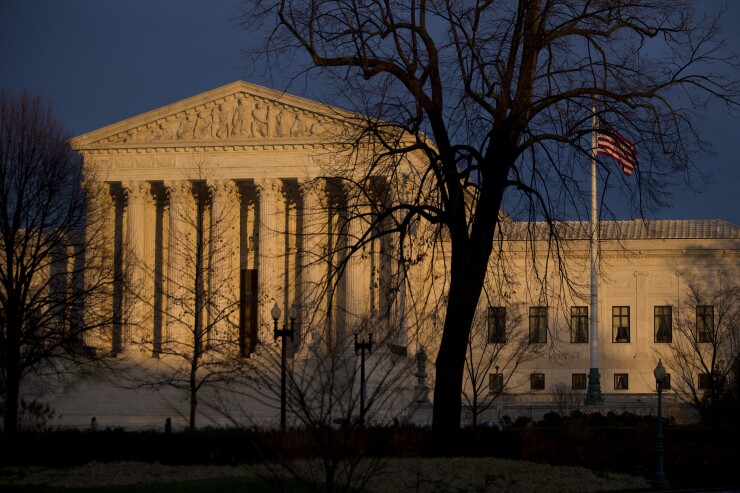
The U.S. Supreme Court placed new restrictions Thursday on the use of in-house judges in regulatory enforcement cases — a watershed decision that's expected to benefit both banks and individual bankers in situations where their regulators have accused them of wrongdoing.
Following
The ruling by the high court's conservative majority
In the banking sphere, the Federal Deposit Insurance Corp, the Federal Reserve, the Office of the Comptroller of the Currency and the Consumer Financial Protection Bureau all use administrative law judges.
Some of the clearest consequences of the ruling in the banking realm, experts said, will involve cases where regulators are seeking civil monetary penalties from either banks or individuals. Those cases will now have to be brought in federal court.
David Zaring, a professor of legal studies and business ethics at the University of Pennsylvania's Wharton School, noted that many enforcement cases are settled rather than go to trial. He said that the prospect of a costly fight in federal court could give additional leverage to defendants who are engaged in settlement talks with regulators.
"Federal court litigation is expensive, and that could weigh into the leverage defendants have when thinking about whether to settle cases involving civil monetary penalties," Zaring said.
He cited three examples of the kinds of cases where the defendants likely would have had a stronger hand to play in settlement talks if the Supreme Court's ruling Thursday had already been in effect.
Under that scenario, securities fraud cases that were brought against big banks after the 2008 financial crisis, anti-money-laundering cases that resulted in large banks paying penalties and cases involving bank employees' use of unauthorized messaging apps, might have been resolved on more favorable terms for the banks, Zaring said.
The penalties in those settlements have often stretched into the hundreds of millions of dollars, if not more than $1 billion.
The implications of Thursday's ruling are less clear for enforcement cases that do not involve civil money penalties, according to experts.
Banking agencies may bring cases, for example, seeking restitution or the disgorgement of ill-gotten gains. They may try to bar individuals from working in the banking industry. They may also seek an order that a specific bank needs to cease and desist from certain conduct.
An enforcement case involving disgorgement could still go before an administrative law judge, Zaring said Thursday, based on his reading of the Supreme Court's decision.
David P. Weber, a former enforcement official at the OCC, the FDIC and the SEC, agreed with that interpretation of the court's decision. But he added that provisions of the Federal Deposit Insurance Act giving bank regulators the ability to bring cases not involving civil money penalties before an administrative law judge will also likely be challenged in court.
"I'm sure that intrepid litigants are now going to challenge all of the provisions," said Weber, who is now a professor at Salisbury University's Perdue School of Business.
Weber also pointed to another difficulty the ruling causes for bank regulators. He said that existing federal laws do not enable the banking agencies to bring certain types of enforcement cases — for example, those alleging that a bank engaged in unsafe and unsound practices — in federal court.
If the courts now take the position that such cases have to be brought in federal court, rather than before an administrative law judge, Weber said: "Until Congress provides a fix, it may be very difficult for federal banking agencies to bring enforcement actions."
Weber was critical of the Supreme Court's decision, arguing that administrative law judges have expertise about banking that federal judges lack.
Defense lawyers are typically far more critical of administrative law judges and the rules of the administrative law system, which lack certain procedural protections that federal courts provide to defendants.
"From my perspective as a defense lawyer, I generally prefer to be before a federal jury than an administrative law judge," said Brad Bondi, a trial attorney at Paul Hastings.
Bondi said that the Supreme Court's decision Thursday restored a pillar of American justice, which is that defendants who face an SEC penalty are entitled to a jury trial.
"This is a landmark decision that has broad ramifications across other government agencies that use administrative proceedings," he said.
The court's opinion was written by Chief Justice John Roberts and joined by Justices Clarence Thomas, Samuel Alito, Neil Gorsuch, Brett Kavanaugh and Amy Coney Barrett.
"A defendant facing a fraud suit has the right to be tried by a jury of his peers before a neutral adjudicator," Roberts wrote.
In a concurring opinion, Gorsuch, who was joined by Thomas, wrote that the close relationship between administrative law judges and the agencies that bring enforcement cases makes it difficult, if not impossible, to convey the image of impartiality.
"Yes, ALJs enjoy some measure of independence as a matter of regulation and statute from the lawyers who pursue charges on behalf of the agency. But they remain servants of the same master — the very agency tasked with prosecuting individuals …" Gorsuch wrote.
In a fiery dissent, Justice Sonia Sotomayor accused the court's conservative majority of engaging in a "power grab" by "arrogating Congress's policymaking role to itself." She wrote that the constitutionality of hundreds of federal laws may now be in jeopardy, and that dozens of agencies could be stripped of their power to enforce laws that Congress has passed.
"The majority pulls a rug out from under Congress," Sotomayor wrote in an opinion joined by Justices Elena Kagan and Ketanji Brown Jackson, "without even acknowledging that its decision upends over two centuries of settled government practice."






